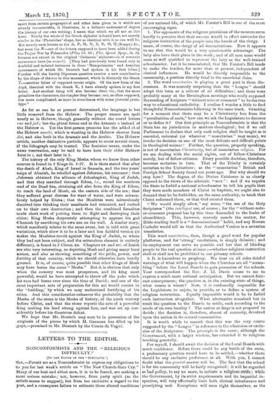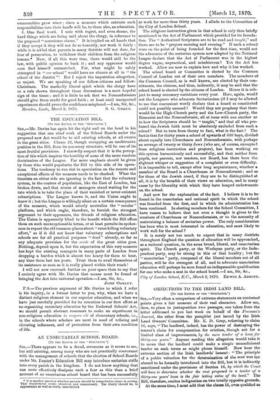LETTERS TO THE EDITOR.
NONCONFORMISTS AND THE "RELIGIOUS DIFFICULTY."
go THE EDITOR OP THE "SPECTATOR.") SIR,—Permit me as a Nonconformist to express my obligations to to you for last week's article on " The New Church-Rate Cry." Many of our best and ablest men, it is to be feared, are making a most serious mistake ; not, however, from party spirit (as the article seems to suggest), but from too exclusive a regard to the past, and a consequent failure to estimate those altered conditions
of our national life, of which Mr. Forster's Bill is one of the most encouraging signs.
1. The opponents of the religious provisions of the measure seem hardly to perceive that their success would in effect surrender the religious instruction of the people into the hands of the clergy. I mean, of course, the clergy of all denominations. Now it appears to me that this would be a very questionable advantage. The laity also have their place in the work ; and of all men none would seem so well qualified to represent the laity as the well-trained schoolmaster. Let it be remembered, that Mr. Forster's Bill tends to make the teacher, far more than at present, independent of clerical influences. He would be directly responsible to the community, a position directly fatal to the sacerdotal claim.
2. The word unsectarian is playing a great part in these dis- cussions. It was scarcely surprising that the " League " should adopt this term as a solvent of all difficulties; and there were probably many at the Birmingham meetings who really supposed the reading of Scripture " without note or comment" to be the true way to educational catholicity. I confess I wonder a little to find thoughtful Nonconformists following in the same track. Granting for a moment that there may be a Christianity free from the "peculiarities of sects," how can we ask the Legislature to discover or to define it? Our first principle as Nonconformists is that the State has no jurisdiction in matters theological ; but if we call Parliament to declare that only such religion shall be taught as is essential, universal (or whatever " unsectarian" may mean), we invoke its decision on one of the most delicate and difficult points in theological science ! Further, the question, properly speaking, is not of unsectarian Christianity, but of unsectarian religion. For we are dealing with the social rights, not of fellow-Christians merely, but of fellow-citizens. Every possible doctrine, therefore, becomes sectarian in turn. That of the Trinity is certainly sectarian to the Unitarians ; as the " unsectarian " British and Foreign School Society found out years ago. But why should we stop here? The dogma of the Divine Existence is as clearly opposed to the views of the atheistic " sect " : and if we require the State to forbid a national schoolmaster to tell his pupils that they were made members of Christ in baptism, we ought also to demand that he be forbidden, on the same authority, to teach that Christ redeemed them, or that God created them.
" We would simply allow," say some, " the use of the Holy Scriptures " (the intelligent use, of course ; for the " without-note- or-comment proposal has by this time descended to the limbo of absurdities). This, however, scarcely mends the matter, for Bible-reading itself is a "denominational" habit, and any Roman Catholic would tell us that the Authorized Version is a sectarian translation.
This word unsectarian, then, though a good word for popular platforms, and for 'strong' resolutions, is simply delusive ; and its employment can serve no possible end but that of blinding people to the real question at issue ;—whether religious instruction shall or shall not be prohibited in our primary schools.
3. It is hazardous to prophesy. We hear on all sides doleful warnings of what will happen when the Churches are all " scram- bling " before the Local Boards to gain possession of the schools. Your correspondent the Rev. J. Ll. Davis seems to me to express a much more rational anticipation. But we cannot fore- cast consequences; the question is, in the existing state of things, what course is wisest? Now, it is confessedly impossible for the Legislature to enjoin, to provide, or to define a system of religious instruction. Equally impossible would it be to forbid such instruction altogether. What alternative remained but to remit the question to the Boards to settle, each according to the needs of its own locality ? The nation at large is not prepared to decide ; the decision is, therefore, almost of necessity, devolved upon the nation in its several communities.
It is worth while to remark that this was the very course suggested by the " League" in reference to the admission or exclu- sion of the Scriptures. The principle is the same ; although the Government, with a larger wisdom, has extended it to religious teaching generally.
For myself, I should await the decision of the Local Boards with much confidence. Before there could be any battle of the sects, a preliminary question would have to be settled,—whether there should be any exclusive preference at all. With you, I cannot doubt what the general answer will be. The fact that the school is for the community will be fairly recognized ; it will be regarded as bad policy, to say no more, to initiate a religious strife ; while the Government, by its strict requirements and its impartial in- spection, will very effectually limit both clerical interference and proselyting zeal. Exceptions will soon right themselves, as the
communities grow wiser ; since a measure which entrusts such responsibilities into their hands will be, to them also, an education.
4. One final word. I note with regret, and even shame, the hard things which are being said about the clergy, in reference to the proposed " conscience clause." It is implied on all hands that if they accept it they will not do so honestly, nor work it fairly : while it is added that parents in many districts will not dare, for fear of persecution, to withdraw their children from the religious lessons.* Now, if all this were true, there would still be the law, with public opinion to back it ; and any oppressor would soon find himself outmatched. For, what might be safely attempted in " our school " would have no chance at all in " the school of the district " ! But I reject the imputation altogether, as unjust. We are speaking of our fellow-citizens and fellow- Christians. The markedly liberal spirit which the clergy have as a role shown throughout these discussions is a most hopeful sign of the times ; and it is little to ask that we Nonconformists should give them credit for good faith ; at least until unexpected experiences should prove the confidence misplaced.—I am, Sir, &c., Rawdon, Leeds, March 9, 1870. S. G. GREEN.



































 Previous page
Previous page